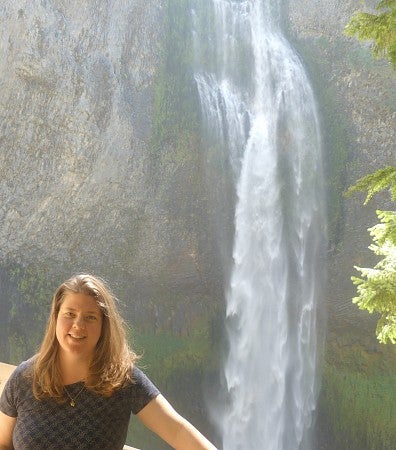
English and Writing
Courses: Writing 123
In my courses you will:
- Learn with and from peers.
- Become research literate.
I was invited into the Teaching Academy because:
- I participated in the UO Summer Teaching Institute.
In what ways are you working to make your teaching inclusive?
I envision my classes as collaborative and inclusive research teams, learning from and teaching one another to enrich the reasoning work of all. In my Writing 123 courses, for example, in order to strike a balance between independence and collaboration, I offer a broad yet unifying theme that links each individual project to the class’s larger research goal: “Making a Better World.” This topic invites students of all majors to follow their academic interests by imagining how they could improve their lives, and the lives of others. When encouraged to direct their learning by delving into real-life controversies that matter to them, students gain a meaningful sense of belonging to our academic community.
What do you do in terms of professional engagement with the teaching and learning culture on campus or nationally?
I select professional engagement activities that connect my pedagogy to campus-wide conversations about best practices and enable me to serve as an ally for my students. I have found a rewarding sense of collaboration with the larger University of Oregon teaching body through the workshops offered by the Teaching Engagement Program, and I regularly seek out enrichment activities to reach and support more students, such as LGBTQIA+ events, a sequence of HR workshops on Emotional Intelligence, a day-long symposium on White Privilege, and a workshop on designing accessible online content. Within the English and Writing Department, I have welcomed exploration of new grading techniques and strategies for Universal Design via participation in the Composition Program's Inclusive Pedagogy Reading Interest Group.
In what ways was your teaching in this course research-led—informed by research on how students learn and inflected by UO's research mission?
I have learned to scaffold the skills needed for success on major assignments via low stakes work early in the term, like focused class workshops before first version essays are due. I have set more precise grading expectations for strong work and clarified the enriching labors needed for excellence. And I have learned to prioritize and distill my feedback, as well as inviting students into their revision process through their own goal setting, for both the course as a whole and their term-long research projects. For example, as my Writing 123 students draw their individualized projects to a close, we reaffirm the importance of their research process via concise Research Presentations. In order to emphasize writing a research essay as a careful multi-stage journey, this presentation entails answering a series of synthesizing questions about key stages of development: What sparked the guiding questions-at-issue for their research? What did they learn throughout their research that most fascinated them? How did their project evolve from proposal to annotated bibliography, and through several drafts with both instructor-assigned revisions and their own chosen goals? What were the most meaningful answers they found? I contextualize this research presentation as an opportunity to teach the rest of the class because teaching is the deepest way to absorb what they have learned. As one of my students aptly observed, “in this class we essentially learned how to learn.”
Why did you become a teacher?
I became an educator due to my love of learning and desire to share my life-long pursuit of understanding with others. Today, one of my greatest joys as an educator continues to be learning alongside my students. From day one in my courses, I set the stage for open-minded inquiry, ethical dialogue, and authentic research by encouraging students to re-envision their education as an active pursuit. I remind students that they are not enrolled in my courses to just absorb knowledge, but also to shape their education. Students play a vital role in shaping the education they achieve by collaborating with peers during class work, answering and asking thoughtful questions during discussions, developing their own logical reasoning in their writing, and offering unique insights in response to the debates they examine via research. I want students to leave my classes recognizing that they too participate in our research mission. By putting diverse texts into conversation in novel ways, sharing personal experiences that have shaped their lives, and offering original reasoning in response to others’ ideas, they inspire our classroom community to understand ideas from new angles, direct us to where further research is needed, and push the boundaries of what we know.
